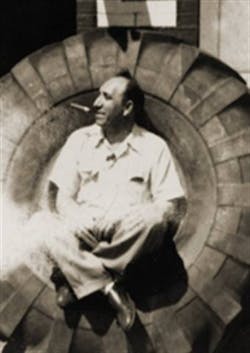'The Roaring '20s,' Municipal Tire-style: Chicago dealership boasts colorful past
By Mike Manges
Municipal Tire & Wheel Co. is one of Chicago's oldest and most successful independent tire dealerships. It also is linked to one of the most notorious periods in "Windy City" history.
Municipal Tire has operated within the same quarter-block area on Chicago's near south side since current owner Sid Rotman's father, Morris Rotman, bought the dealership in 1925.
Russian by birth, Morris had emigrated to Chicago from Turkey two years earlier. The burly 22-year-old, who had an agrarian upbringing, found a job delivering ice and coal to tenement buildings. Soon he was recruited by a local man who owned a vulcanizing shop and became partners with him.
"They were looking for a name for the company," says Sid. "The biggest attraction in Chicago at the time was Municipal Pier (now Navy Pier)."
Morris, who was learning to speak English, asked a man what the word "municipal" meant. "He was told, 'For the people,' and he said, 'That's gonna be our name!'"
Little did Morris know his customers would soon encompass people on both sides of the law!
During the 1920s, Municipal Tire -- at the time a tiny shop that mounted and demounted tires on the curb -- was located three or four blocks down the street from the headquarters of infamous Prohibition-era bootlegger and underworld boss Al Capone.
The surrounding neighborhood was a bona fide "red light district," according to Sid, with speakeasies, brothels and other "vice dens."
One morning, while Capone was at the height of his power, a glistening black Packard pulled up in front of Morris' shop. "Two guys in suits, fedoras, spats -- the whole deal -- get out and start walking toward the office."
Morris, a tough guy in his own right, was fully aware of Capone's activities and watched them with a suspicious eye.
"One of them walks up to my dad and says, 'Hey! You got tires for 'dis car?" Dad says, 'Yeah, but I'll have to get them from the warehouse.'
"'How long will it take?'
"'It'll be done this afternoon.'
"'Good,' they say, without inquiring about the tires' price. 'Put on the best!'"
The men left and Morris picked up the tires, brought them back to his shop and mounted them. They returned that afternoon. "'How much do we owe ya?' they ask. Dad shows them his invoice and says, 'Whatever you think is fair.' They take out a roll of bills, pay him for the tires, and throw in an extra $20 -- which equaled his weekly profit at the time!
"'You don't have to worry,' they tell him. 'You mind your business, we'll mind ours, and everything will be OK.'"
Morris, whose reign on Chicago's south side outlasted Capone's by several decades, never saw the shady characters again.
And while the old neighborhood is a different place these days, some things haven't changed completely, says Sid. "We don't have gangsters anymore, but we still have politicians!"



